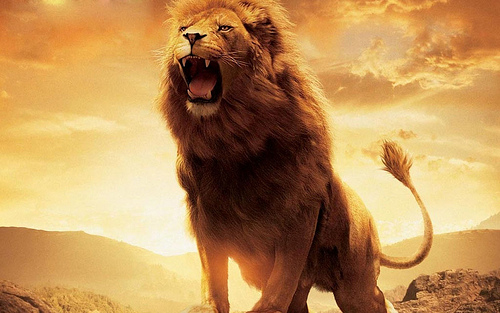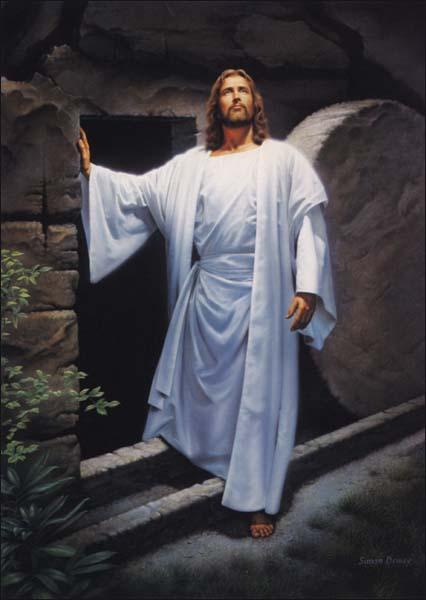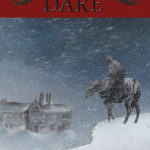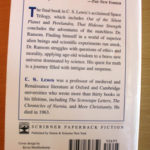The Deeper Magic of Easter
I was watching television last night, and was struck by a commercial. I can’t remember precisely what they were selling, or even who they were. But the ad introduced me to the cringeworthy phrase, “The Magic of Easter.”
I mean that literally, by the way: I actually cringed–and not just internally. I’m used to “the magic of Christmas” by now–I’ve even written positively on the topic. But “The Magic of Easter?”
Okay, I get it: a bunny hopping around hiding eggs and toys–or on a deeper level, the renewal and rebirth of Spring–can, indeed, bring to mind something magical. And maybe it’s just the sheer commercialization of the holiday, the complete neglect of the resurrection which gives this time of year its significance as a “holy day,” that renders the phrase “the Magic of Easter” as irritating to me on a visceral level as dragging one’s fingernails down a chalkboard.
 But, digging even deeper, reminding myself of the very reason behind our veneration of this day, perhaps I, too, can find some magic in it. C. S. Lewis certainly did:
But, digging even deeper, reminding myself of the very reason behind our veneration of this day, perhaps I, too, can find some magic in it. C. S. Lewis certainly did:
“It means that though the Witch knew the Deep Magic, there is a magic deeper still which she did not know. Her knowledge goes back only to the dawn of time. But if she could have looked a little further back, into the stillness and the darkness before Time dawned, she would have read there a different incantation. She would have known that when a willing victim who had committed no treachery was killed in a traitor’s stead, the Table would crack and Death itself would start working backwards.”
— Aslan, The Lion, The Witch, and the Wardrobe, Chapter 15
Though Lewis’s Chronicles stop short of pure allegory, his is a point well-taken. There is indeed something powerful–something magical–about the willing sacrifice of self for the sake of another. Take it a step further and realize that, in the case of Easter, we celebrate the sacrifice of God Himself for our sake, and then His resurrection, which in turn paves the way for our own resurrection. Now, bear with me here. I’m about to tell you something that you’ve probably heard every Easter Sunday since early childhood. But I have a good reason for doing so: I fear that, through repetition, Easter has lost some of its impact. Some of its meaning.
Pick a word, any word, and repeat it to yourself over and over again, say, thirty times. How long did it take before the word became a meaningless jumble of syllables? I contend this same effect is present in too many of our important doctrines and traditions in the Church as well. So let’s take another look.
Jesus took upon Himself a burden we could never carry–the full weight of our sin and humanity–and instead of allowing that burden to drag us into Hell, as it was destined to do, allowed it to drag Him instead. He paid the full wage of our sin–death–in full.
That we must pay for our rebellion against God is what Lewis refers to in The Lion, The Witch, and the Wardrobe, as Deep Magic. The law, in short, that governs our relationship to the Almighty. It was this Deep Magic, this Law, that Jesus fulfilled through His death on the Cross.
But in doing so, He put a Deeper Magic into play. By choosing to carry that burden and die in our place, specifically because He was pure and innocent and undeserving of that death, He turned the Law, the Deep Magic, on its head. He reversed death and rendered it meaningless.
Paul writes in 1 Corinthians 15:55-57:
O, Death, where is your victory?
O, Hades, where is your sting?
The sting of death is sin, and the strength of sin is the law. But thanks be to God, who gives us the victory through our Lord Jesus Christ.
Think of it! In our humanity, our future held only the Grave. But Christ defeated the very concept of death, enslaved it, and bent it to His will. And He, in turn, has given us the gift of victory, through Him, over death as well.
There is Magic to Easter. It is something deeper by far than the magic of marketing and merchandising. Deeper, even, than getting your agnostic relatives to comb their hair, put on spring-colored slacks, ties, or dresses, and fill the pews at your church.
The Deeper–Deepest–Magic of Easter is nothing less than the payment in full of our debt to God, and our victory, through Christ, over the one thing to which every living being must one day submit. We, those who find hope in Christ, are given victory even over death itself.









































PUT THE “STAR” BACK IN “OSTARA”!!!!1!!!
Amen, Randy! Well said! Easter is anything but mundane, anything but rote. It is the once and for all, undisputed championship of God over sin, death, hell, and the devil. It is amazing that anyone or anything would seek to upstage it or ignore it. I’m with you brother. Let’s raise a shout of declaration. He is risen!
Vague feelings of superficial joy permeate the illusion of ‘the magic of Easter’ as it is laid out before a blind and deaf audience. We smile at the bunny, the chocolate, and the tulips. We laugh at the children hunting for hidden eggs in the grass. We are busy. We are too distracted by the trappings of Easter to meditate on the meaning behind the hidden eggs. We are lulled into this pseudo joy thinking it is the real deal, as good as it gets. We are happy.
I’m not condemning any of these things. But my little inner voice reminds me that I must not confuse ‘happy’ with ‘deep, true joy’. Screwtape must be laughing. How simple. Let the humans believe they have found joy when, in fact, they are distracted from and blinded to the source of the deepest joy … the true deep magic of Easter. He is risen indeed. Thank you for reminding us.